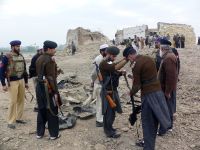US President Bill Clinton spoke with Israeli Prime Minister Ehud Barak for the second time on Sunday in an effort to "find a pathway back to the negotiating table," a senior White House official said.
In an interview with the cable network CNN, White House Chief of Staff John Podesta said that, although violence still rages between Israelis and Palestinians, both sides took steps at last week's Sharm el-Sheikh summit to "keep some commitments that they both have made to reduce violence and then find a pathway back to the negotiating table."
On Sunday, Barak announced a "time-out" from the Middle East peace process that will remain in effect as long as violent clashes continue in the Palestinian territories.
Podesta acknowledged that "there have been time-outs in the past" and said that, "given the circumstances, you can understand the frustration."
But, he said, "we don't want to see a long time-out from the peacemaking process."
"We will have to work with both parties to meet their obligations, to meet their commitments under the Sharm el-Sheikh agreement, and then we have to find our way back to the peacemaking process," Podesta said.
Regarding the Arab summit in Cairo, which called for action against Israel for the three weeks of violence in which more than 100 Palestinians have been killed, Podesta said there was "a lot of hot and, frankly, unfortunate rhetoric coming out of the summit."
But despite what he termed the "mixed news" emanating from the summit, Podesta said he was pleased that "the moderate voices led by (Egyptian President Hosni) Mubarak have won out."
Podesta said Clinton spoke with Palestinian leader Yasser Arafat on Friday and with Barak on Saturday and again on Sunday, in a push toward implementing the Sharm el-Sheikh agreement.
He said the process will be an uphill climb until violence is brought under control, but he vowed that officials are "going to work very hard at it."
Although "some implementation has taken place," he said that "while the violence still goes on in the streets in the West Bank and Gaza, not enough is being done and both sides need to do more."
Podesta said Arafat has made some positive moves toward peace, particularly by issuing a call to peace after the Sharm el-Sheikh summit. But he said that Arafat "controls his security forces, and they need to do more to make sure that provocations don't take place."
"Maybe he can't control everything," Podesta said, "but it's clear he can control some things and he does have considerable authority."
As for Barak, Podesta said: "What we need to do is to try to keep the commitments that were made (and) move forward on some of them," by opening the airport and "inner passageways."
He stressed the need to end clashes, to keep the parties separated and to try to restore calm.
Earlier on Sunday, Barak also praised Mubarak's "balanced approach" to the summit and said that Mubarak appeared to lead "the summit in a responsible and considered fashion and sees regional peace and Israeli and Palestinian agreement as the main goal for all states in the region" -- WASHINGTON (AFP)
© 2000 Al Bawaba (www.albawaba.com)







